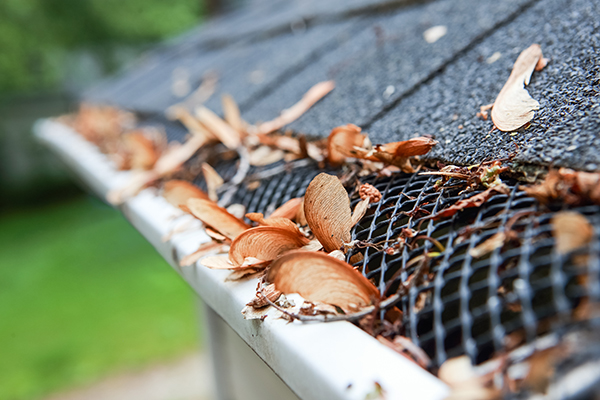You don’t usually see them touted in listing descriptions or on home design shows, but your home’s gutters are actually a very important feature of your property. That’s because gutters and downspouts direct water away from your home’s roof and foundation, helping to prevent moisture damage that can lead to damage, deterioration, and pests. Many homeowners make the mistake of not thinking about their gutters until something goes wrong, but that could be a costly error. Here’s what you need to know.

They need to be cleaned.
To keep them functioning properly, it’s necessary to keep gutters clear of leaves and debris. Otherwise, gutters can stop up and cause leaks. Even if you don’t have tall trees on your property, wind may still blow leaves and debris into your gutters. If you live in cold climate, clogged gutters can lead to ice dams on your roof. Blocked gutters can even attract some pests. To clean gutters, you can use your gloved hands, a garden hose, or a pressure washer to clear them. Screens, barriers, or gutter guards can help minimize debris, but may not eliminate cleaning altogether, especially if you have a lot of trees on your property.
RELATED: Preparing Your Home For The Winter Season
They need to be inspected.
Gutters can get damaged, especially when they are made from aluminum. Inspect gutters regularly to see if they are dented or bent bent from falling limbs, or if they are pulling away from the structure. If joints at corners, end caps, or downspouts fail and leak, they’ll need to be repaired with caulk. During your inspection, you should also check for rust, holes, or weak spots. It’s a good idea to always inspect the gutters after a big storm.
They may need to be replaced.
When gutters need to be replaced depends largely on how much rain and debris they handle regularly, as well as the materials that comprise them. If your gutters are leaking regularly, rusting, or coming apart, you should probably consider replacing them instead of repairing them. A good time to replace gutters is when you replace your home’s roof. Gutters come in a variety of materials, including aluminum, copper, galvanized steel, vinyl, and plastic. They also come in a variety of price ranges. Talk to a professional contractor to determine which materials are best for your house and situation, and how long you should expect each material to last. For an eco-friendly option, consider installing a rainwater collection system with your gutters. This enables you to recycle rainwater to irrigate your lawns and landscape. Filtration is even available for some systems.
Gutters are one way to protect your home and budget. Another way is to have HSA Home Warranty coverage. An HSA Home Warranty is a one-year service contract that covers many home system and appliance components when they break down. Much like gutters, you may not think about the value of home warranty coverage until you need it. To find out more about the advantages of HSA Home Warranty protection for homeowners, visit onlinehsa.com.